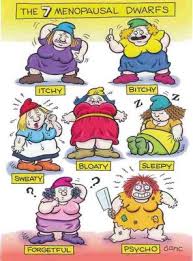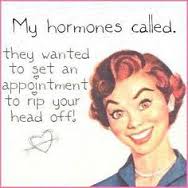
I remember the day I got my period. I was in 8th grade and feeling completely left out because I was one of the last of my friends to get it. My best friend and I had been sent out in the hall by our PE teacher for being a little too social and right there in the hall it happened. I knew exactly what to do because my friends and I had talked incessantly about every detail regarding this momentous day in our life. I was ready.
Then came trying to get pregnant, being pregnant, and labor and delivery. Again, it’s all we talked about. I could always find someone experiencing what I was going through or a story of what to prepare for and this camaraderie got me through. I was ready.
Next came female problems of another sort. Ablations, hysterectomies, D&Cs, birth control…anything to get that mess down there fixed up and healthy. Obviously not everyone could relate, but the ones that could shared their experiences and put me at ease. I knew what to expect. Again, I was ready.
Now the start of a new phase and for the first time, I’m not ready. Finally a topic my friends aren’t talking about and I’m not sure why…perimenopause and menopause. Of course we talk about the hot flashes, the insomnia, and the weight gain. Some of us even talk about the mood swings. And if we are lucky enough, we have someone to talk to about the depression, loss of libido, and affect on our marriage and family. But mostly there is silence. I’m wondering if it’s because everyone feels as lost as I do. There was no question I had my period or I was pregnant or that I needed a hysterectomy but now I’m questioning this…am I in perimenopause or am I just crazy?
First, a brief health lesson. I started researching this topic for my own sanity and came upon my life line. A blog called The Perimenopause Blog (yes, people are actually blogging about this!) In her post titled Symptoms of Perimenopause Symptoms of Menopause (http://www.theperimenopauseblog.com/symptoms-of-perimenopause-symptoms-of-menopause/) Magnolia Miller explains it this way.
Perimenopause is a transitional period a woman goes through where her estrogen and progesterone levels are fluctuating until she becomes fully menopausal. During perimenopause, her ovaries will produce less and less progesterone and estrogen until she no longer has a menstrual cycle. A woman is said to be menopausal once she has gone twelve consecutive months without a menstrual cycle. Once a woman reaches actual menopause (the average is four years but it can take up to ten!!), her ovaries are no longer producing enough progesterone and estrogen to support monthly menstrual cycles. While most women find menopause to be a wonderful, peaceful time of life, the low estrogen levels common in menopause can put many women at a higher risk for a number of health issues such as osteoporosis, bone and joint degeneration, and chronic depression.
But there’s a lot more going on. The author of the blog says she started blogging about this because the anxiety and emotional turmoil she was experiencing made her truly believe she might be going crazy. She goes on to say, “It’s difficult to explain to others who have not been through it, what perimenopause feels like. It’s especially difficult to explain to our husbands who can’t begin to understand or even remotely connect to the female experience. Not only is this frustrating but it can add to the feelings of isolation and vulnerability.”
It seems from my research, the medical field agrees there are about 35 symptoms you might experience during perimenopause. Obviously you will not experience all of these things (thank goodness!) and some of you many never experience any of them. Personally, I was able to identify at least 15 symptoms on this list I am experiencing or have experienced at some point. No wonder I feel crazy!
35 Symptoms of Perimenopause
- Hot flashes, flushes, night sweats and/or cold flashes, clammy feeling
- Irregular heart beat
- Irritability
- Mood swings, sudden tears
- Trouble sleeping through the night (with or without night sweats)
- Irregular periods; shorter, lighter periods; heavier periods, flooding; phantom periods, shorter cycles, longer cycles
- Loss of libido
- Dry vagina
- Crashing fatigue
- Anxiety, feeling ill at ease
- Feelings of dread, apprehension, doom
- Difficulty concentrating, disorientation, mental confusion
- Disturbing memory lapses
- Incontinence, especially upon sneezing, laughing; urge incontinence
- Itchy, crawly skin
- Aching, sore joints, muscles and tendons
- Increased tension in muscles
- Breast tenderness
- Headache change: increase or decrease
- Gastrointestinal distress, indigestion, flatulence, gas pain, nausea
- Sudden bouts of bloat
- Depression
- Exacerbation of existing conditions
- Increase in allergies
- Weight gain
- Hair loss or thinning, head, pubic, or whole body; increase in facial hair
- Dizziness, vertigo, light-headedness, episodes of loss of balance
- Changes in body odor
- Electric shock sensation under the skin and in the head
- Tingling in the extremities
- Gum problems, increased bleeding
- Burning tongue, burning roof of mouth, bad taste in mouth, change in breath odor
- Osteoporosis (after several years)
- Changes in fingernails: softer, crack or break easier
- Tinnitus: ringing in ears, bells, ‘whooshing,’ buzzing etc.
But what I am finding so fascinating in my research is the profound psychological and emotional changes that go hand in hand with the physical changes during this time. As I googled menopause, article after article came up about the effects of menopause on a marriage. Did you know that over 60 percent of divorces are initiated by women in their 40s, 50s or 60s — the menopause years — according to a recent survey conducted by AARP Magazine. Other articles put that number as high as 70%.
Why you ask? Obviously it could be many, many reasons unrelated to menopause, but I was interested in learning more about the correlation between menopause and marriage. What I found out is summed up best by Lori Phillips, BellaOnline Marriage Editor, in an article called Menopause and Marriage (http://www.bellaonline.com/articles/art1379.asp). She explains it this way.
Studies show that early in life when women’s estrogen levels are high, they feel a sense of maternal nurturing. To ensure the survival of the family, they become the peace-makers and caretakers. As menopause ensues, estrogen levels drop while testosterone levels rise. A woman suddenly feels less inclined to be the pleaser. The increase of testosterone makes her more prone to thinking about her own needs. A lot of women suddenly think, “I’ve put everyone first in my life. There are things about him and our marriage that I don’t want to put up with anymore.” It leads many women to re-think their lives and their newfound sense of self compels them to break away from old priorities—child-rearing and husband-caretaking--and embark on new paths that allow them to pursue personal goals.
I am in no way saying that menopause causes divorce. A struggling marriage was probably struggling way before menopause and a strong marriage will survive it just fine. But it does shed some light as to why some women find themselves disconnected at this time in their life. I am not divorced or planning to get divorced but I have certainly felt this disconnect myself.
It also helps to know I’m not alone in everything I’ve been feeling lately…that I’m really not crazy. In fact, I’m more normal than I ever knew. I’ve been to several doctors looking for answers to what’s wrong with me and I’m not alone there either. I read comment after comment of women describing going from doctor to doctor looking for answers. Some quit their jobs because the symptoms were so severe, while others thought they were dying. And in the end, they were all found to be “healthy” and “just perimenopausal”. All said the emotional changes are far worse than the physical changes as there seems to be more help and acknowledgement of the physical stuff, but they felt very alone in this new emotional turmoil they feel trapped in.
I can promise you it’s not “just perimenopausal” when you are going through it but there is help! Treatment varies from lifestyle changes to hormone replacement therapy. Go see your doctor! Take this post if you need to! Highlight your symptoms! Advocate for yourself! Don’t settle for …”you are fine.” And let’s start talking about this! Nothing is as scary when you realize you’re not alone.

 RSS Feed
RSS Feed
